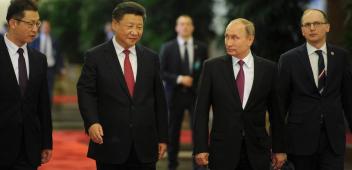European politics: The young centrists strike back
Originally published in the Australian Financial Review.

For the second time in two months, elections in Europe have led to gains for pro-European centrists. The election of Donald Trump in the US is turning voters against right-wing populists – despite, or precisely because of, their positioning as Trump clones.
Emmanuel Macron, a centrist candidate, and Marine Le Pen, of the far-right-wing National Front, will advance to a run-off in the French presidential election after a first-round vote on April 23.
None of the arguments that Le Pen would outperform her polls in the first round held up. Her 21.3 per cent of the vote, though sizeable, indicated no silent majority of Frexiteers. Macron is now in a dominant position. In polls testing the two-way match-up, he leads by an average of 26 points, far outside any margin of error, and is predicted to get more than 60 per cent of the final vote.
For the first time in the age of mass electoral discontent, we may see a clear win for Europe. France will almost certainly not follow the path that led to the Brexit referendum.
Neither Macron nor Le Pen would have made it without the deep crises affecting France. Every political rule in the Fifth Republic has been crushed.
The crowning achievement of the French "dégagiste" (disengage) mood came with the defeat in the first round of the two parties that have dominated politics for decades. Conservative François Fillon and Socialist Benoît Hamon gathered little more than a quarter of the votes between them. Both were crippled by self-inflicted injuries. But at a broader level, their misfortunes may well mark the end of France's two-party system.
So far, so abnormal. The big story in Western democracies is the decline of old parties. Political scientists point to long-term trends, including the perception that established parties have failed to manage globalisation or improve lives.
There is another layer to this story, however. Commentators were right to seize on the enormity of the political shift but wrong about what would fill the vacuum.
As the Dutch general elections illustrated in March, voter fatigue with old left-right party politics need not take on populist expression. Instead, an electoral shellacking of the traditional parties was achieved by younger centrist parties. The Dutch – experts at flood control – built a powerful dam against their own right-wing demagogue, Geert Wilders.
Europeans have seen how Brexit has isolated Britain and do not want the same fate. Their dislike of President Trump's policies is turning them off anti-immigration platforms more broadly. Le Pen's attempts in recent days to recast herself as a stateswoman by leaving the leadership of Front National suggests she knows this. She seeks to channel less of Donald Trump and more of Charles de Gaulle.
The impacts of globalisation continue to energise much of the electorate. Fringe parties on the left and right have more in common than their ideological differences suggest. Between the far left and far right, some 40 per cent of the French voted for some variety of economic nationalism.
However, a majority know national exorcism would be impractical and very likely highly damaging. The reality is Le Pen is in a much deeper hole than Trump ever was. The critical difference with the US is that the centre right in France will not endorse the far right. Short of which, the Élysée remains all but blocked for Le Pen.
The risk is very rarely that fringe parties win outright but that mainstream parties usurp the populist mantle by adopting their policies. As Britain heads for snap elections in June, centrist parties have abandoned a majority of voters who would prefer a soft Brexit, and a significant minority who would rather not see one at all. Labour has moved to a Brexit policy virtually identical to that of the ruling Conservatives, whose newfound zealotry has made Nigel Farage look redundant.
None of this is inevitable. At a time when nationalist rhetoric is ubiquitous, Macron has dared to buck the nativist trend. He campaigns visibly and without discomfiture for Europe. His "New Deal", launched in Berlin, is critical of Europe's faults but constructive on the need for greater shared sovereignty.
Pan-European reforms – including on monetary and fiscal policy – to cure France of its national ills is a tall order. Macron will have to engage two constituencies largely outside his control: the anti-reform French National Assembly and a German political class that is itself nearing election time. All the while, populists will have the luxury of opposition from which to critique every economic setback, political deadlock, and terrorist attack.
The optimism and ambition of Macron's platform could yet frustrate him in office. But for the next week, when his job is to soak up voters from across the political spectrum against Le Pen, they will be his assets. His success has already proven the electoral rewards of sticking to the values of the centre ground.
Australia's political class might take heed: when one talks of the importance of values, those of the centre are what count.



